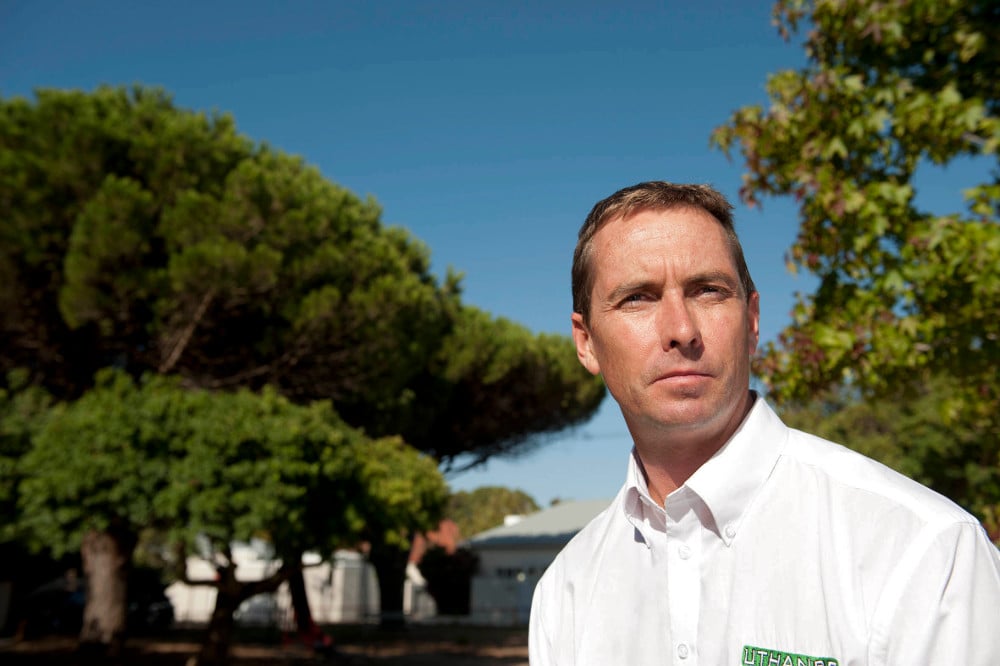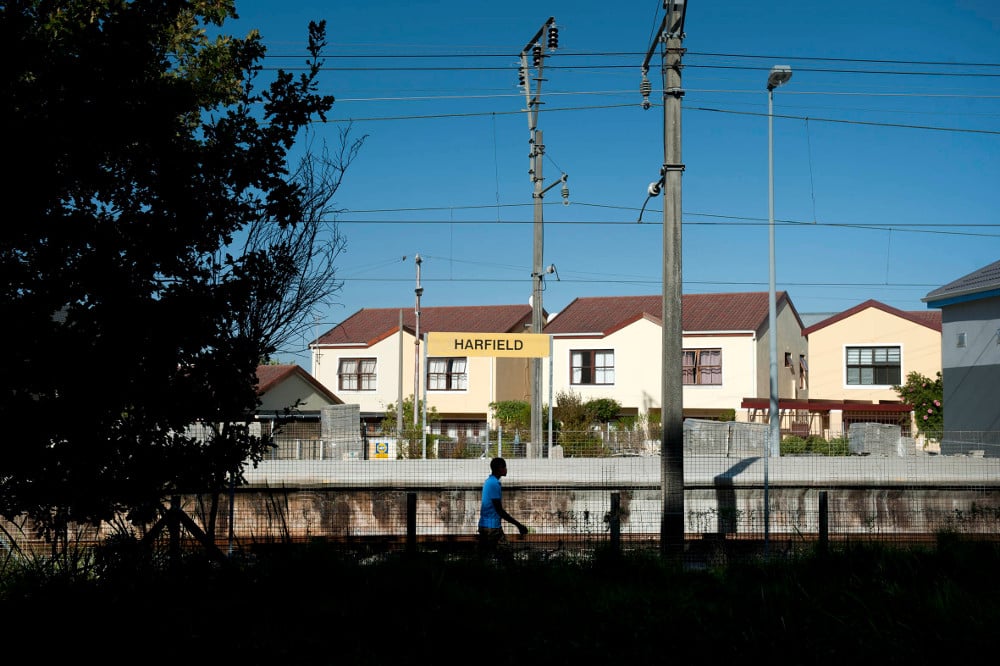Three youngsters walking through Harfield Village could be labelled 'suspicious' on the suburb's Facebook page.
It’s just after 3pm in Harfield Village, Cape Town. The streets are quiet – a few patrons sit outside restaurants; a police vehicle cruises past every few minutes. Picket fences and electric fencing border cottages and Anglican or Methodist churches dot the landscape. Domestic workers walk white children to the nearby park, carrying rucksacks, or walk beside them as they cycle in the streets.
It’s the face of suburbia, where gardeners and painters are always at work and, if it weren’t for the graffiti scrawled on the wall of a construction site proclaiming in bold black letters: This is a “heritage site”, it would be hard to know this area once suffered a sad history when coloured people were forcibly removed under apartheid.
Despite its quaint charm, it is a community divided.
Harfield Village, neighbouring Kenilworth, is one section of the greater Claremont area where several racial incidents have occurred. The most recent took place in Harfield Village on January 3: former Reddam House junior tennis coach Talana-Jo Huysamer (23) allegedly assaulted Chantlé Hoffmann with a taser in a dispute over a parking space. Huysamer is alleged to have called Hoffmann a k***** repeatedly. It is the state’s case that she allegedly told Huysamer: “You better move your f****** car or I will taser you the f*** out of here” and “You f****** k*****, you don’t belong here. You should go back where you belong.”
Huysamer has been charged with assault with intent to do grievous bodily harm. She is out on bail.
Other incidents
There have been other incidents. In October a Manenberg cleaner was allegedly attacked and racially assaulted by three men in Claremont. In the same month a domestic worker in Kenilworth was attacked. In Claremont last year, gardener Muhammed Makungwa was sjambokked, allegedly by South African National Defence Force dentist Jan van Tonder, who was later charged with attempted murder.
Is it coincidence that the spate of racial incidents has taken place here?
“Not at all,” says Clare Ballard, a human rights lawyer and, until recently, a Harfield Village resident. “There is demonisation of the poor here. This is not a coincidence. “
Ballard said she’d taken issue with what she considers racial profiling on the Harfield Village Association’s (HVA) Facebook page, which considers itself a “community noticeboard”.
Residents often use the social media platform as a way to alert one another of “suspicious” people in the area.
“These posts were about creating suspicion based on race and people who are black and are considered outsiders,” said Ballard, who said she used the association’s page to express her outrage at the practice.
She has since been bullied online – so much so that she was banned from the page.
Ballard said that one resident had discovered that she was part of a prisoners’ rights litigation programme and that it had fuelled the idea that she was sensitive to “criminals”.
Difficult to take issue
For Leila Emdon, who has lived in Harfield Village since 2013, it has been equally difficult to take issue with the views of some residents.
Emdon is a programme co-ordinator at Masifundise Development Trust, an organisation that promotes the rights of fishing communities.
She echoed Ballard’s sentiments, saying the community – predominantly white – “is complicit in white privilege”.
“White neighbourhoods haven’t addressed their role in reconciliation,” she said.

Harfield Village Association chairperson James Fernie says people should not be identified by race. (David Harrison, M&G)
Emdon has also taken issue with HVA’s Facebook page on which residents have posted pictures of people walking around the area whom they deemed “suspicious”. She, too, was banned from the Facebook page after raising her concerns but has since been invited back.
Emdon said there had been a wave of crime in the area at the end of last year, which had heightened the community’s sense of fear. She was adamant, however, that the racial profiling was deliberate.
Emdon said she was keen to start an open discussion so that residents could talk about ways of challenging racism and their role in post-apartheid South Africa.
“People feel you can get rid of racism by doing charity. The goal of this [open dialogue] initiative is to have a community discussion about white privilege. It is not a coincidence that these incidences occurred here. It is not the job of whites to say when racism is over or that it doesn’t exist.”
Emdon said Harfield Village was a microcosm of many other predominantly white communities.
“If you pick a place and analyse it, you will find that it’s racist,” she said.
‘Suspicious’ people
On January 19, another post appeared on the HVA Facebook page, appealing for residents not to be fearful of identifying “suspicious” people by their race.
It said: “Unfortunately, some individuals have accused our community of racial profiling … so much so that I see postings now where our good folk are too scared to describe the race of any suspicious people. When this intimidation first started, some people innocently started to describe the race of the suspicious people as ‘Charlie, Bravo and Whiskey.”
Charlie refers to coloureds, Bravo to blacks and Whiskey to whites.
It continued: “All police alerts and incident reports will state the suspected culprit’s race; we must continue giving a detailed description of suspicious people in our area. This is not racial profiling.”

Some residents say posts on the Harfield Village site target black people as potential criminals and demonise the poor. (David Harrison, M&G)
HVA chairperson James Fernie has lived in the area since 2003 and has headed the association for four years. He runs Uthando, a nonprofit organisation that raises funds for community development.
He acknowledges the dissent among Harfield Village residents and has started many collection drives in the area for the neighbouring informal settlement in Philippi to bridge the divide.
‘Comfort zone’
Fernie said, although he had received many donations, it was not easy to get residents out of their “comfort zone”. None of the donors had accompanied him to deliver the items to Philippi.
“I have tried to get people out of their comfort zone so they can see how their neighbours are living but people are afraid. There is a fear of personal safety and the unknown.
“Those who do venture out [into poorer communities] always come back with their eyes open … it’s not a big and scary world.”
Fernie said he was “extremely concerned” about the racial incidents that had occurred in the area.
“I wish the community was more integrated.
“I feel white South Africans haven’t made sufficient effort … in terms of integration. How many can say hello in isiXhosa? In Harfield, not many.”
Racial profiling
He believed there was racial profiling involved when “suspicious” people were identified by race.
“I don’t think we should be suspicious of any person of colour who just happens to be in the community.”

Cleaner Delia Adonis and her son Tesh-Lee. She was allegedly assaulted in the parking lot of Claremont’s Stadium on Main Centre (where she worked) last year. (Esa Alexander, Gallo)
But is Harfield Village racist?
“Oh gosh, that is the million dollar question,” said Fernie.
“There are elements of racism and bigotry in every community, just like [in] Harfield. But we also have exceptionally good people here who would fight bigotry.”
Countrywide racism
Professor Daniel Plaatjies is the executive director of democracy, governance, service delivery and social cohesion at the Human Sciences Research Council.
He echoed that posting the race of people deemed unsavoury was racial profiling.
Plaatjies said it was crucial for Western Cape leaders, from business to politics, to speak out openly against racism.
“We need whites to say to whites that racism is not OK. We need politicians to say: ‘If you are racist, we don’t want your vote’,” said Plaatjies, a Claremont resident.
“If we don’t deal with it [racism], we are sitting on a societal time bomb.”
He said he saw racism in his community every day – and not only by whites against blacks, but also coloureds against blacks.
“Some refer to Cape Town as the last bastion of racism, [but] you will find racism throughout South Africa.